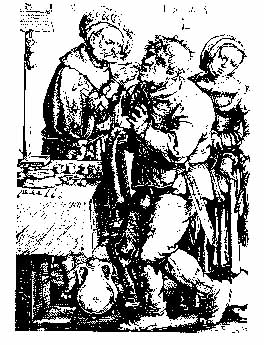
BY AUBREY C, KAIL, WILLIAMS AND WILKINS, BALGOWLAH, NEW SOUTH WALES ; 1986.
†††††Every October, I begin to wonder what to get my doctor for Christmas.
Being a doctor myself, I receive professional
courtesy, which obligates me to bestow a suitable token of gratitude
at the holiday season. Shall it be a membership in Harry and David's Fruit-of-the-Month
Club, a twenty-pound tin of stale popcorn from the Popcorn Factory, five
pounds of jumbo collosal gargantuan herculean natural pistachios, an assortment
of Wolferman's large-holed English muffins, a ten-pound bar of Ghirardelli
chocolate, a fruitcake from the Trappist monks with the density of molten
lead?
†††††And so, when I received this book for review, I thought my problem
for this year would be solved. It is a beautifully
printed book, with clear brown type, wide margins, and thick shiny
paper. It is full of lovely reproductions, medieval woodcuts and Renaissance
paintings, many of them in bright colors. And it's big and heavy--just
the thing for my doctor's coffee table at Christmas. .
One problem: it's boring.
The author, a physician from New South Wales, has compiled a simplistic
collection of medical
allusions from Shakespeare. He performs a sterile medical dissection
of the Bard's masterpieces, all the while remaining oblivious to the humanity,
the brilliance and the poetry of the patient upon whom he operates.
†††††It turns out that Lady Macbeth is neurotic, a compulsive handwasher obsessed with guilt, She says:
andWill all great Neptune's ocean wash this blood
Clean from my hand?
Imagine what a little bit of behavior therapy could have done for her.All the perfumes of Arabia will not sweeten this little hand.
†††††Her husband is also in a bad way. He suffers from visual hallucinations:
Off to bedlam with you, Macbeth. Perhaps you can plead not guilty by reason of insanity.Is this a dagger which I see before me...?
†††††In a brilliant analysis of Hamlet's soliloquys:
Dr. Kail concludes that the Dane is melancholy, clinically depressed, yea, verily, suicidal. That Shakespeare, he sure knewO, that this too too solid flesh would melt
and
To be, or not to be--that is the question,
Come, on my right hand, for this ear is deaf,
And tell me truly what thou think'st of him.
Gonzalo had arthritis:
And Romeo must have suffered from hyperventilation syndrome:My old bones ache,
†††††My doctor doesn't need to read this book. My doctor needs to read Shakespeare,Juliet: How art thou out of breath, when thou hast breath
To say to me that thou art out of breath?
†††† To Dr. Kail, I say:
Or, in a kinder vein:Doctor, your service for this time is ended;
Take your own way.
(Cymbeline, I,v,4)
Let's purge this choler without letting bloodó
This we prescribe, though no physician:
Deep malice makes too deep incision.
Forget, forgive; conclude and be agreed:
Our doctors say this is no month to bleed.
(Richard II, I, i, 153)

A dentist at work. Dentistry was practiced by anyone who was brave enough
to aquire the skills. Many quacks posed as tooth-drawers and displayed
their technique in the street before audiences of passers-by. Engraving
by Lucas van Leyden, 1523 (Courtesy of Rijksmuseum, Amsterdam)